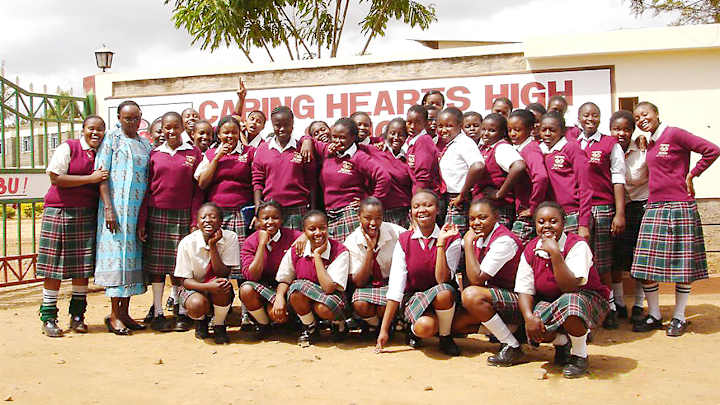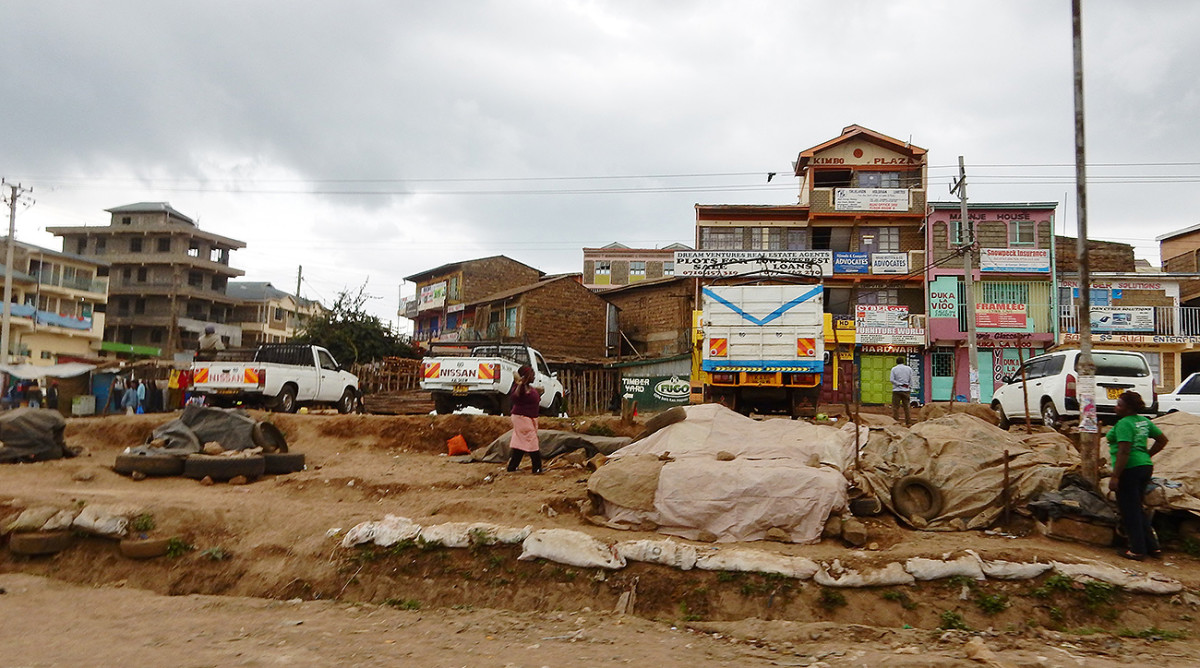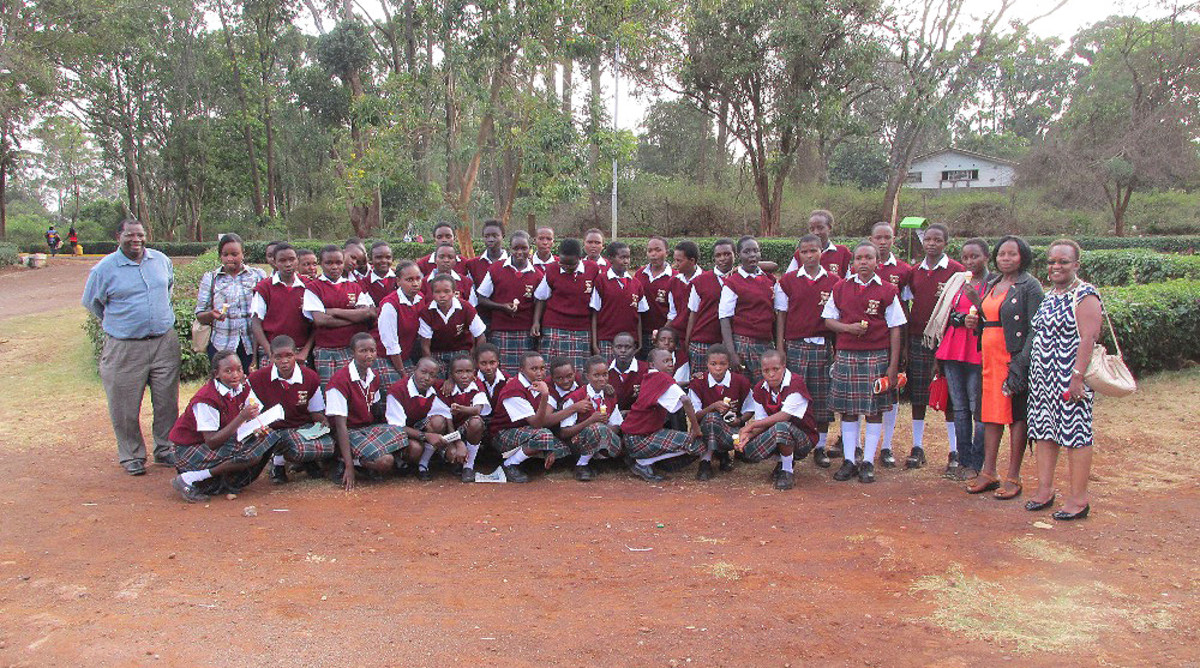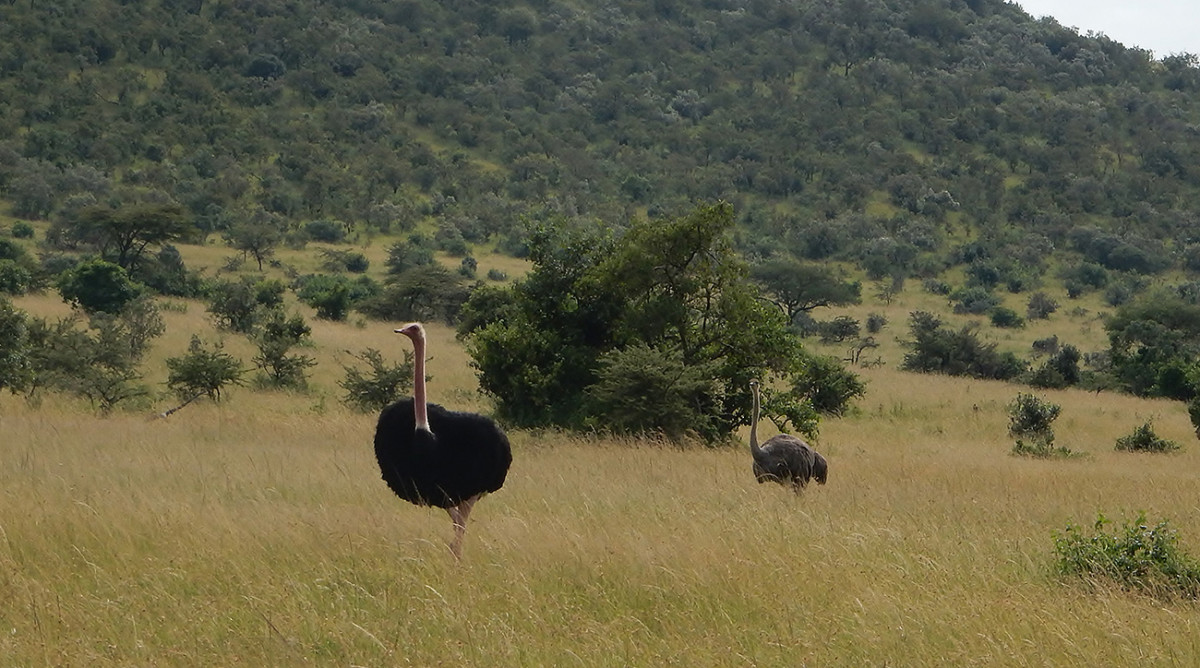A Learning Experience of a Lifetime: Andy Benoit’s Week Without Football in Kenya

I don’t get pushed out of my comfort zone often, but when I do, it tends to be way out. Like to Africa, for example.
A year ago I met Vincent Kituku, a nationally acclaimed motivational speaker who is well known in Boise as a newspaper columnist and professor. Vincent is a gregarious storyteller with an enthusiasm for learning about new things and people. He emigrated from Kenya to the University of Wyoming in 1986 to pursue graduate studies, and applied for asylum in ’94, which prevented him from returning home until 2010.
When he did go back to Kenya, Kituku found his community decimated by government corruption and AIDS. His sense of duty kicked in and Kituku started a charity called Caring Hearts and Hands of Hope, with the mission of providing Kenya’s youth—especially its orphans—with safety and education. The organization currently sponsors 250 vulnerable high schoolers and another 65 students in universities and vocational colleges.
Four years ago, as part of the Caring Hearts and Hands of Hope organization, he opened a private boarding facility for girls called Caring Hearts High School. In Kenya, young women are at risk of being forced into child labor, early marriages and prostitution, among other dangers. Being educated and the safety of living at a boarding school as teenagers greatly reduces these risks.
These days Kituku lives about two months of the year in Kenya and the rest in Idaho. He spends endless hours meeting with community leaders and donors to raise money for Caring Hearts, and when I became one of his supporters last year he said he’d like to take me to Africa to see the school. I initially declined, citing “work-related” reasons. But Kituku has a knack for getting his way. He moved his summer tour up a few weeks so that it would not conflict with NFL training camps. It was impossible to say no after that, especially considering by then he’d gotten my parents and four of their friends to sign up.
As a nice little vacation present, my MMQB editors asked me to write about the trip. For me it was a week with zero football for the first time since preschool, and they wanted know how I’d manage.
After a surprisingly brisk 30 hours of flying—24 of which I spent working, stretching or eating, and the other six in a beautiful pill-induced slumber—we landed in Nairobi. The city’s humidity and elevation, which is 600 feet higher than Denver’s, creates a uniquely fresh air. Kituku took us to a hotel with walls that were a combination of cinder block and cement, painted six different shades of red and pink; unforgiving hard tile floors; a thin, springy mattress encased by a mosquito net and no hot water. And if that doesn’t sound great, consider that most Kenyan citizens live in much more modest accomodations. Our hotel was near the U.S. embassy, and even in one of the nicest parts of town, litter and grime were not uncommon.
Caring Hearts High School is a bumpy two-hour drive outside of Nairobi, and because the traffic grinds to a standstill early every morning, we left our hotel each day at 6 a.m. Fortunately, our driver was excellent (in Kenya, that means aggressive) and Kituku often provided entertaining stories and information.
But our daily drive also revealed the extreme poverty in which many people live in this country. Many buildings along the way are unfinished; from what I was told, Kenya’s lending system is so shaky that you get a loan for one part of the building, construct that part, then get another loan for another part and so on. Once the building is complete, you pay taxes on it—so there’s no incentive to ever complete the building.

When we arrived at Caring Hearts, located deep in the backroads, all 165 students had gathered for our arrival. We were fed, lauded and performed for. Parents from throughout the village showed up. The community’s—and especially the students’—gratitude was wonderful but undue. We were humbled.
Kituku believes that the world is divided not between rich and poor, black and white or strong and weak, but rather, between the educated and uneducated, especially in Kenya. He preaches this to the girls, and donations to Caring Hearts make a significant impact. But what surprised me was how much value those girls, when afforded the resources, bring in return. The program enables them to reach their potential.
The Kenyan girls at Caring Hearts display a strong capacity to learn—they’re invested and disciplined, they never break eye contact when someone is speaking and they often ask thoughtful and well-constructed questions (always asked in English, the girls’ second language behind Swahili, which has different variations amongst Kenya’s 42 tribes). The Kenyan girls are enthused about many things, and though they’re shy in the company of outsiders, they still embrace the vulnerability it takes to come up and introduce themselves to a stranger out of the blue.
At Caring Hearts, curriculum ranges from basic life skills like cooking, cleaning and health care to complex subjects like molecular chemistry. One day a lady from our tour group and I taught four different hour-long classes that consisted of just answering questions about our American way of life I was not aware I’d be teaching the class and therefore had no lesson plan. It didn’t matter, because the girls asked questions in a rapid-fire manner. Some things the girls understood immediately, and I felt foolish for having thought they wouldn’t, while the opposite was true for other things—and it was fun because we never could predict which way it would go.

The girls were fascinated by American marriage. They knew all about exchanging rings and merging assets. They couldn’t believe, however, that a man pays nothing to the family of a woman he marries. In their experience in Kenya, it’s called a “bride price.” A girl leaves her family’s home the day she gets married, and the bride price is supposed to offset that loss. The woman I taught with would fetch, according to the students, something in the range of 50 cows, a few bushels of bananas, some sugar and a little over 10,000 shillings (the equivalent of $100) in Kenya. Polygamy is legal in Kenya and common in traditional communities, so a man sometimes pays several bride prices to different families. A woman, however, can have just one husband.
I had the opportunity to meet the girl I sponsor, Selena, who is in her first year in high school and hails from a mud hut village in Maasai Mara. The huts are no more than six feet tall and about 400 square feet divided into four or five rooms. Inside they’re almost pitch-black even during the day. Beds are made of bamboo and sticks, some with a broken-down cardboard box on top. More than half a dozen people sleep inside, along with the family’s goats. And the mud is actually animal dung (mostly elephant), so the village has a distinctive odor and flies are so abundant that kids do not react to them.
Selena and her family are fully aware of their destitution, knowing that the rest of the world, and even not-to-distant neighborhoods, live with electricity, running water and shelter—and that makes her situation that much more heartbreaking. After we met, Kituku told me she came up to him to and broke down in tears of appreciation.
We spent three days at Caring Hearts and another at a neighboring school for young boys (50 of whom were blind), where we were again humbled by our reception. While in Nairobi we also did typical tourist activities, like a bus tour through Nairobi and—the most clichéd but entertaining—a safari, where we saw almost all the Lion King characters.

The safari was supposed to be a camping expedition—or “glamping,” which The MMQB’s Kalyn Kahler explained to me meant “glamorous camping.” But thanks to my mother’s punishingly aggressive Celiac disease, Kituku worried about the accessibility of appropriate food for her, so we stayed in a high-end Maasai Mara resort. The staff there made a big show about guests needing an escort to walk the grounds after 9:30 p.m., because that’s when the uncaged hippopotamuses that lived just 70 meters away from the rooms would be feeding. (You could hear the hippos all night; they make all the sloppy, gluttonous sounds that their appearance suggests.) An astute observer, however, could see that the escorts were armed with only flashlights (which Africans call “torches”). Apparently, man-made light scares off most African animals.
As the trip progressed, I realized that my mind never drifted to football. The only sports news I heard was LeBron James opting out of his Cavs contract, which scrolled across a CNN ticker in our hotel lobby on the trip’s final day. To fully embrace the trip, I disconnected entirely. I eschewed anything that could be viewed on a screen and all forms of Western music (except for a brief conversation about Rihanna and Drake, whom the Caring Hearts students love). Downtime was rare, and I spent it sitting quietly.
My first football thoughts came when I was packing to leave and found some film-study notes in my bag for the plane. My heart jumped ever so slightly, though I’m proud to say I moved along and enjoyed the trip’s final day. That is, until the last five hours, which were spent at the Nairobi airport. After the fifth (yes, FIVE) security check—which, like the previous two, involved a full luggage scan—you’re left in an un-air-conditioned waiting room with no water (it can’t go through security) and no restroom. It’s there where I wrote this article. And so I can say, as much as I enjoyed Kenya, valued the learning experience and loved the Caring Hearts students, I couldn’t wait to get home.
• Question or comment? Email us at talkback@themmqb.com.
